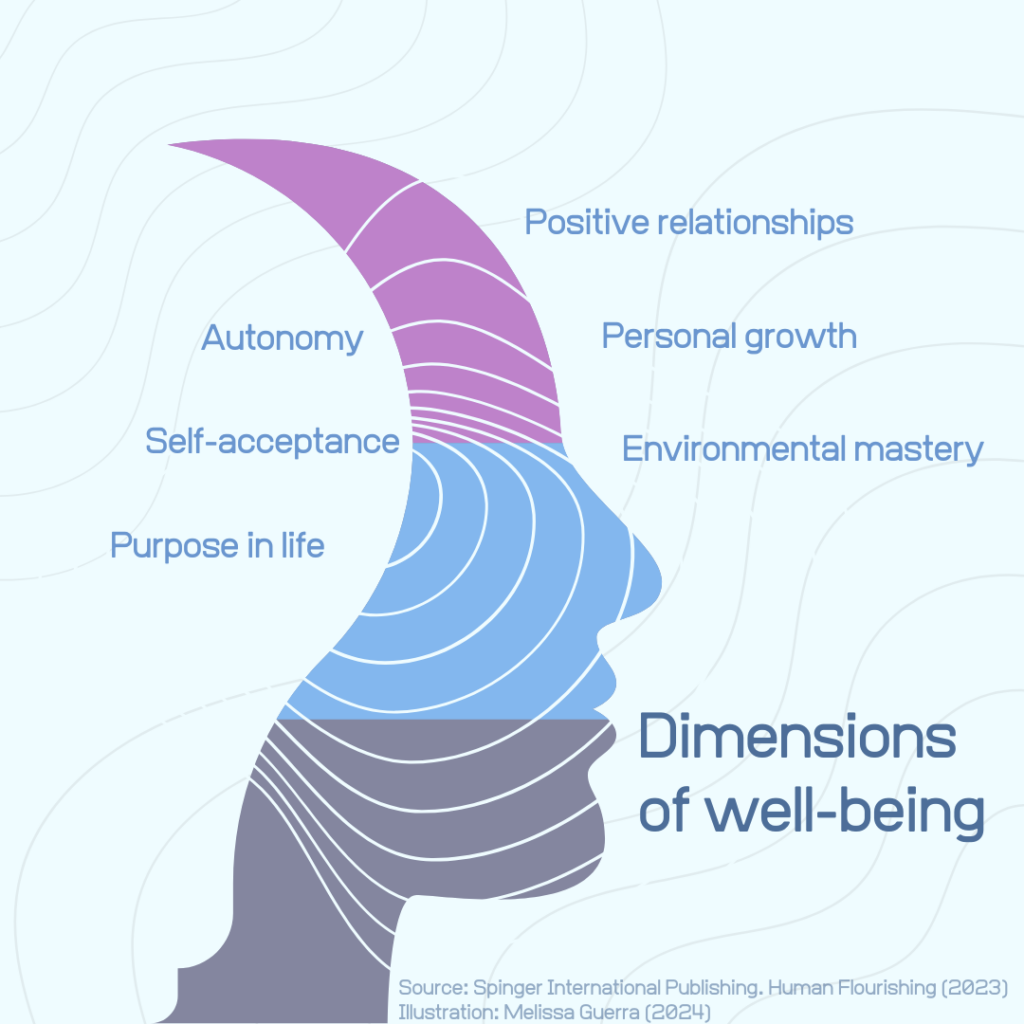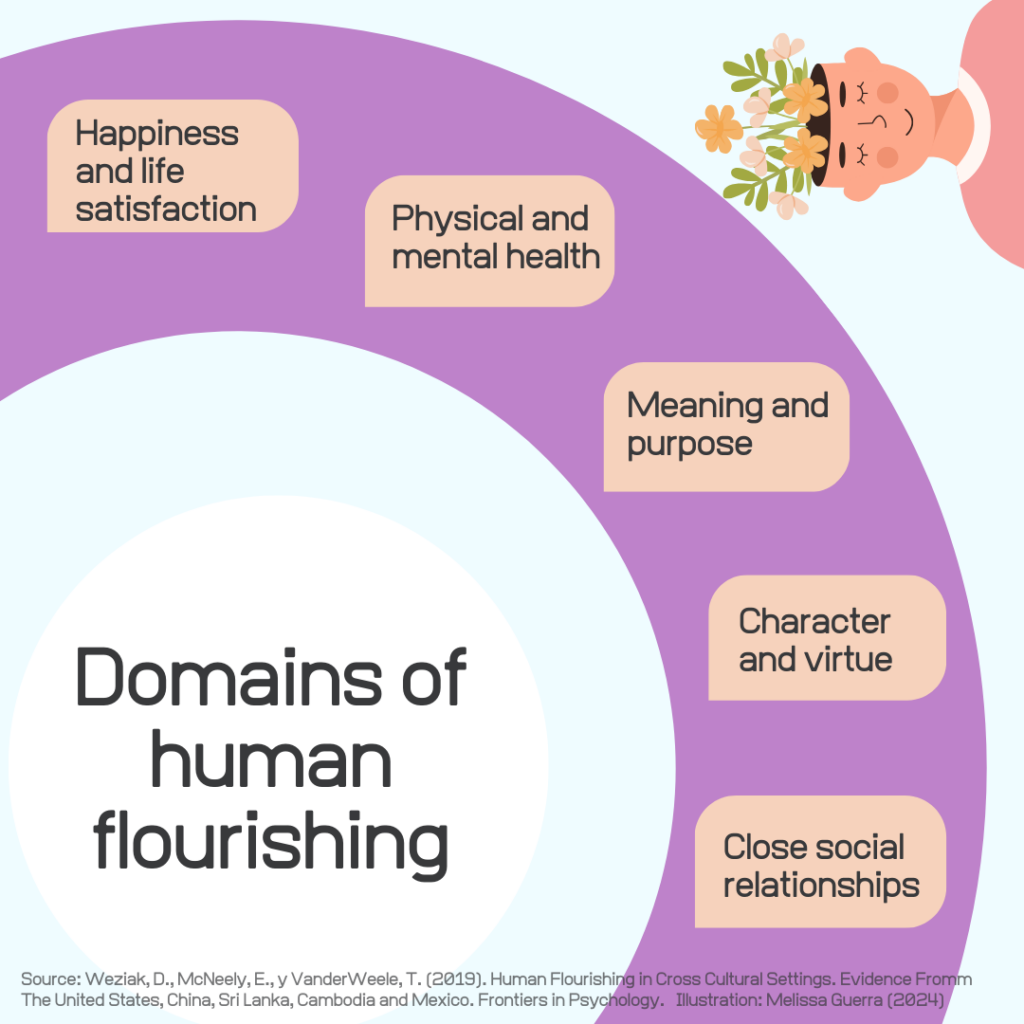In a previous article, it was discussed the ethical principles of artificial intelligence (AI), emphasizing its generalities and education-focused principles. Nevertheless, ethical work goes far beyond studying human conduct and moral notions of good and evil.
Due to the accelerated development of Artificial Intelligence (AI), where there are more and better options for programs, generative AI, analytics, and applications every day, it is essential to consider the leading actor: the human being.
Humanity must not lose what makes a person human. Although there are dynamic and continuous technological changes, finding balance, i.e., integral well-being, is critical. While a seemingly simple concept, human flourishing has many ramifications and approaches, so attention must be paid to AI’s role in this discussion.
A Brief Philosophical Overview of Human Flourishing
Eudaimonia
This philosophical concept of Aristotelian ethics refers to the fact that happiness goes far beyond the hedonic since the supreme good (happiness) is the activity of the soul by virtue.
In Aristotle’s work “Nicomachean Ethics,” virtue is “an elective habit consisting of a middle ground relative to us, regulated by right reasoning in the manner of a truly prudent man. It is a mean between two vices, one of excess and the other a defect, where the latter fails to attain and exceeds what is necessary for passions and actions, while virtue finds and chooses the middle ground. Therefore, according to the entity and the definition established by its essence, virtue is a middle ground, but concerning the best and the good, it is an extreme.”
In addition, the Aristotelian current establishes two types of virtues, ethical or moral (everyday actions) and dianoetic or intellectual (wisdom and reflective thinking); however, Aristotle held that virtue per se was the path to eudaimonia.
Eudaimonic well-being
From the concept of eudaimonia, Carol Ryff, a renowned American psychologist, developed the Model of Dimensions of Psychological Well-Being, which establishes the six dimensions of well-being:

It is worth mentioning that Ryff’s model has been the precursor to many of the positive psychology approaches to understanding and studying human flourishing.
What is human flourishing?
Coming from the Latin word florere (to flourish), human flourishing is a multidimensional concept, so it can focus on and relate to various aspects, such as positive emotions, relationships, meaning, and achievement. Some authors link it to physical and mental health and associated variables, for example, social and financial well-being. On the other hand, some models of positive psychology, like that of Martin Seligman, consider character strengths, virtues, and mindfulness as pillars to promote and guide people toward human flourishing.
The 2030 Agenda of Tecnológico de Monterrey expresses its vision of Leadership, Innovation, and Entrepreneurship for Human Flourishing as “the process of developing the capacities, strengths, and virtues of the person in the various areas of life. It is a conscious process that responds to personal convictions, purpose, and actions and is interrelated with social and environmental conditions. Its achievement contributes to constructing a better world, thus making it an end.”
Thus, in recent years, there have been attempts to link human flourishing with the virtue of forgiveness, although this continues to be studied.
The Human Flourishing Program
Tyler J. VanderWele, a professor at Harvard University, believes that human flourishing transcends psychological well-being, considering it a stage in which all human states are good. The Human Flourishing Program, established by Harvard University, proposes VanderWeele’s five domains of human flourishing:

Notably, a sixth domain in VanWeeler’s model, material and financial stability, is used in studies of flourishing over time.
According to studies related to this model, despite having the lowest scores in finances and material stability, Mexico scores high in meaning and purpose in life. Also, in the category of close relationships, Mexico and the United States excel in supportive relationships and love in life, while China has the lowest scores in this indicator.
Human Flourishing and Artificial Intelligence
In the imminent era of Artificial Intelligence (AI), ethics plays a critical role because AI has interpretative flexibility, which generally means that it is tough to predict what can be done with it. However, one of the uses of Artificial Intelligence (least expected by many) is to promote human flourishing. But how is this possible? AI cannot be viewed in isolation. How it is implemented and developed for the good of society (everything related to the ethical and political perceptions of this, plus considering the socio-economic, cultural, and political spheres of society) has much to do with AI’s role in promoting human flourishing.
For example, process optimization can lead to higher incomes and social welfare, contributing to one of the current domains of human flourishing. Nevertheless, the debate continues, emphasizing human rights in the digital era of AI. Some of these are:
- Dignity and caring for older people.
- Digital gap.
- Unemployment.
- Prejudice and discrimination.
- Data privacy protection.
- Rights (including robots’ rights).
- Responsibility.
- Freedom of thought and democracy.
- Health and environmental problems.
- Security and misuse of information.
Therefore, attention must be paid to how AI ecosystems are developed and regulated to support human flourishing, considering ethical principles and governance of Artificial Intelligence. However, this also implies inevitable moral disagreements and conflicts of values because society is a dynamic entity.
So, although human flourishing is a broad concept, its understanding and development are paramount for individual and collective well-being. Therefore, the role of AI in promoting human flourishing must be analyzed by the relevant bodies (government, decision-makers, stakeholders, etc.) to facilitate the innovation, design, development, and implementation of AI technologies and ecosystems within an ethical framework of operation, which ensures human rights and considers their critical aspects.
Translated by Daniel Wetta
This article from Observatory of the Institute for the Future of Education may be shared under the terms of the license CC BY-NC-SA 4.0 
)
)


)